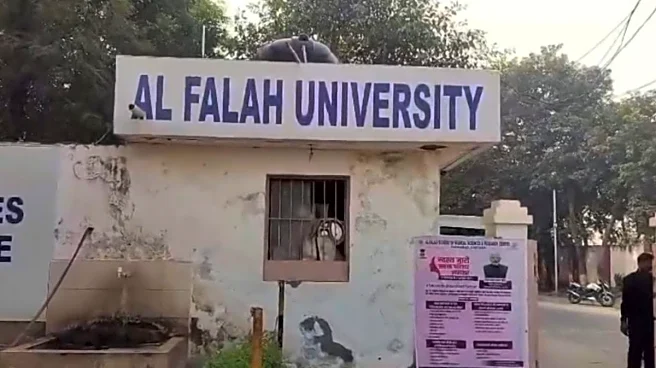The Enforcement Directorate (ED) on Tuesday arrested Al Falah Group founder Jawad Ahmed Siddiqui in an alleged money laundering case linked to Al Falah Charitable Trust.
The probe agency, in a statement,
said that Siddiqui was arrested under Section 19 of the Prevention of Money Laundering Act (PMLA), 2002, following a detailed investigation and analysis of evidences gathered during search conducted at premises related to Al Falah group in the ongoing probe linked to to allegations of fraudulent accreditation claims by Faridabad’s Al-Falah University.
VIDEO | Enforcement Directorate arrests Al-Falah Group Chairman Jawad Ahmad Siddiqui after day-long raids in terror financing-linked money laundering case. Visuals are from Okhla office.#AlFalah #JawadAhmedSiddiqui #EnforcementDirectorate pic.twitter.com/MOTHufGGAk
— Press Trust of India (@PTI_News) November 18, 2025
What’s The Case?
The ED initiated its investigation on the basis of two FIRs registered by the Delhi Police’s Crime Branch in connection with forgery and cheating after concerns were raised by the University Grants Commission (UGC) and the National Assessment and Accreditation Council (NAAC).
The FIRs stated that the university falsely portrayed itself as recognised under Section 12(B) of the UGC Act, a status that allows institutions to receive central grants. The University Grants Commission (UGC), however, clarified during the probe that Al-Falah University is included only under Section 2(f) as a state private university, has never applied for inclusion under Section 12(B), and is not eligible for any grants under the provision.
As per the ED, Al-Falah Charitable Trust was constituted by a public charitable trust deed dated 08.09.1995, with Jawad Ahmad Siddiqui named as one of the first trustees and designated as the Managing Trustee. All the educational institutions (university and colleges) are ultimately owned and financially consolidated under this trust, which is effectively controlled by Jawad Ahmad Siddiqui.
Despite its rapid expansion since the 1990s into a major educational conglomerate, investigators said the group’s growth was “not backed by adequate financials.”
ED Searches At 19 Locations
On Tuesday, the ED conducted search operations at 19 locations across Delhi, including premises of Al-Falah University and the residences of key group personnel. During search, over Rs 48 lakh cash, multiple digital devices and documentary evidence were found and seized by the probe agency.
ED further found that construction and catering contracts were regularly routed to entities owned by Siddiqui’s wife and children, indicating systematic diversion of trust funds. Evidence points to layering of funds, routing money through shell entities, and generating large amounts of proceeds of crime.
Nine shell companies linked to the Al-Falah group, all registered at a single address, are under examination. Early findings point to multiple risk indicators consistent with shell-company behaviour
The ED further said that Siddiqui exercised effective control over the trust and its financial operations, directing decisions that enabled generation and layering of illegal proceeds. Multiple pieces of evidence—including cash recovery, fund diversion trails, and internal documents—were cited as establishing his role in the alleged criminal activity.
After “establishing his culpability” in the offences under PMLA, Siddiqui was formally arrested on Tuesday following due legal procedure. He has been produced before a court for ED custody.
Why Al Falah Made Headlines?
Already facing ED heat over suspected terror funding, the Al Falah University in Faridabad caught at the centre of the investigation into the Delhi Red Fort blast case as several of the accused in the case, including doctors and academics, were either alumni or employees of the institution, which is now being probed for possible links to a wider terror network.
A high-intensity blast from a slow-moving car ripped through the Red Fort metro station area last week killed at least 15 people and left several others injured. Hours before the blast, eight people were arrested, and 2,900 kilograms of explosives were seized in what police described as a “white-collar terror module”, spanning Kashmir, Haryana and Uttar Pradesh, linked to the Jaish-e-Mohammed and Ansar Ghazwat-ul-Hind.
Dr Umar Nabi, the suspected suicide attacker, was an assistant professor at the university’s medical college. Two others, Dr Muzzamil Shakeel and Dr Shaheen Shahid, arrested with arms, ammunition and explosive material, also worked at the university.
On November 13, a show-cause notice was issued to the University, which has emerged as the epicentre of the terror module. The University is neither accredited nor has applied for accreditation. The website of the University was also taken down.
All About Al Falah University
Located in Dhauj, the university with a 70-acre campus was recognised by the University Grants Commission (UGC) in 2015. It also houses a 650-bed charitable hospital called the Al-Falah Hospital, which is a part of the Al-Falah School of Medical Sciences and Research Center. There are also separate hostel facilities for boys and girls.
Apart from the university, the Trust also operates several other educational institutions, including the Al-Falah School of Engineering and Technology, Brown Hill College of Engineering and Technology, Al-Falah School of Education and Training, Al-Falah School of Physical and Molecular Sciences, Al-Falah School of Commerce and Management, and Al-Falah School of Paramedical and Health Sciences.


/images/ppid_a911dc6a-image-177088344131221560.webp)





/images/ppid_59c68470-image-177088261751149179.webp)

/images/ppid_59c68470-image-177088252673355494.webp)
/images/ppid_59c68470-image-17708825857201631.webp)
/images/ppid_59c68470-image-177088255620941443.webp)
/images/ppid_59c68470-image-177088253353351703.webp)
/images/ppid_59c68470-image-177088255557086348.webp)